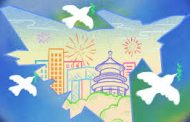For several successive days, protests and road closures continued in Khartoum and other cities in response to the high prices and general lack of bread and fuel.
The bread crisis in Khartoum is reportedly caused by cuts in the allocation of flour to the state. In North Darfur, students demonstrated against the lack of bread, high transportation costs, and deteriorating education system.
The barricades is known in the world centuries ago, and the first people to use it are the French in their uprising against the monarchy years before the French Revolution.
In Sudan people recall the famous Barricades Night during the uprising against General Abboud regime as one of the tools of the civil disobedience, as people were urged to barricade the streets to abort the military attempts in failing the uprising.
In December glorious revolution, the barricades and road closures by the youth mainly aimed at obstructing the security forces from entering into the districts, hence protecting the protesters from the extreme violence which was used against them.
The barricades were also used at the entrances of the military HQ to prevent the attempts of the security to break up the sit-in.
Now, and after the success of the revolution, one of the most recognized benefits is allowing for the freedom of expression including protesting against the government.
In the recent days the protesters closed off a large number of main roads, creating barricades and setting fire to car tyres without being suppressed by the riot police force.
So, and as long as there is no fierce intervention from the riot police or other security forces , we believe that there is no need for the barricades and the protestors can easily raise their demands to the officials in a civilized manner instead of dismantling the sidewalks and smashing the windshield of the cars.
Dismantling the sidewalks and smashing the windshield of the cars are stubborn deeds and are not consistent with the slogans of December glorious revolution.
There is difference between chaos and freedom, and what is practiced now is overstepping all the redlines towards dragging the nations into security instability.
We cannot blame the police forces for not suppressing those protests as they were subject to fierce and organized attack following its confronting the protestors who climbed the walls of the council of ministers buildings, despite the fact they used the minimum force through only using the teargas.
We urge the concerned authorities to issue an act to control the right of protesting instead of the ongoing slap-dash.









